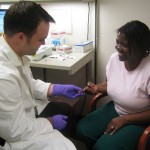Can Volunteering for a Political Campaign Help Your Patients?
ASHP Past-President Schultz Shows How Personal Advocacy Can Move the Needle for Pharmacy
THE EXPERIENCE THAT KATHRYN R. SCHULTZ, Pharm.D., MPH, FASHP, has had in the advocacy realm proves the old adage that all politics is local.
The ASHP past president and current director of pharmacy for St. Croix Regional Medical Center in St. Croix Falls, Wisc., has been actively involved in advocating on behalf of pharmacists and pharmacy for more than 10 years. She has participated in many of ASHP’s Legislative Days and took those opportunities to speak with Sen. Al Franken (D-Minn.), Sen. Amy Klobuchar (D-Minn.), and Rep. Betty McCollum (D-Minn.), and their staffs both in Washington, D.C., and at their offices in her home state of Minnesota.
Most recently, Schultz volunteered for Sen. Al Franken’s reelection campaign. For Franken, Schultz worked the phones to reach out to voters, talk about the importance of going to the polls, and discuss where the senator stands on various issues.
“I like the phone bank, in particular, because the campaign staff members really prepare you well. Although I’m well-versed in healthcare, I need a little help in discussing other public issues,” Schultz said. “It’s good because you don’t feel like you need to be a political expert on everything, and though I’m not comfortable knocking on doors, I do like talking to people.”
The phone bank enables Schultz to reach as many people as possible, which she feels is crucial to Franken’s reelection. “In the last election, he only won by 312 votes after a protracted recount, so the focus has been on making sure people know that their votes are really important.”
Relying on Your Knowledge and Training
Schultz feels it’s paramount that pharmacists stay abreast of what their senators and representatives are doing that can affect the profession and to speak out on pharmacy’s behalf. Given the current status of H.R. 4190 and ASHP’s focused advocacy to achieve provider status, Schultz thinks it’s more important than ever for pharmacists to get involved in politics at the local level.
I’m really happy to be doing something that can positively affect pharmacy and patient care in this country.
Schultz acknowledges that reaching out to elected officials and getting involved in the campaigns of pharmacy-friendly candidates may seem intimidating. However, she reminds pharmacists to trust in their knowledge and training.
“I was concerned that my meetings with the senator and his staff would be very formal and that they might be skeptical of what I had to say about pharmacists’ critical role in patient care. But they weren’t,” Schultz said. “They really respect that pharmacists are medication experts, and they look to us for important information.”
Schultz believes that all pharmacists can bring better awareness about patients’ medication needs to their elected officials. “You know the issues that affect pharmacy and patient care better than they do. And, with ASHP behind you to provide any information you may need, you have all the necessary tools at your disposal. Don’t be shy!”
Building rapport is also essential to achieving a productive give-and-take, according to Schultz.
“I look at the process as a relationship: First, you provide the necessary information that your elected officials need. Then, you can ask them if they will support measures to improve pharmacy practice and patient care.”
Getting Behind a Pharmacy-Friendly Candidate
Knowing the issues and interacting with senators and representatives regularly on behalf of the profession make it easier to get out there and campaign, Schultz noted. She volunteered for the Franken campaign in part because of his past involvement in proposing legislation to help pharmacists manage the challenges of sterile compounding.

Kathryn Schultz joins Franken campaign organizer Patrick Chilton to call potential voters with information about Franken’s stance on healthcare and other issues.
Along with Sens. Tom Harkin (D-Iowa), Lamar Alexander (R-Tenn.), and Pat Roberts (R-Kan.), Franken introduced S. 959 in 2013, the Pharmaceutical Compounding Quality and Accountability Act. This legislation was designed to create a new category of producer called “compounding manufacturer” that must register with and be inspected by the Food and Drug Administration.
According to Schultz, although pharmacists and pharmacy students may worry that political involvement may negatively affect their jobs or careers, in reality, it may actually help.
“I like to think of this kind of activism as a way to differentiate yourself from the herd. For me, it shows that I truly care about macro issues in pharmacy, that I’m not one-dimensional, and that I am active in my community.”
Schultz stresses the importance of involvement for pharmacy students, in particular.
“You’ll be in your career for 20 or 30 years, so it behooves you to do whatever you can to try to help your legislators understand the pharmacy issues that will help achieve better patient care—such as provider status—and to make the changes that will help,” she said. “What Congress does will affect your professional future.”
Overall, Schultz said that she wouldn’t trade her political experiences and time spent volunteering regardless of the outcome of the election.
“With so many people to help you and to give you the tools that you need, it’s easy and it’s actually fun. I’ve met people I never would have met otherwise, people with whom I share common goals and political views. I’m really happy to be doing something that can positively affect pharmacy and patient care in this country.”
–By Terri D’Arrigo









 If you want to contribute tutorials, news or other stuff please contact us. We pay 150 for each approved article.
If you want to contribute tutorials, news or other stuff please contact us. We pay 150 for each approved article. Consectetur adipisicing elit. Sed do eiusmod tempor incididunt ut labore.
Consectetur adipisicing elit. Sed do eiusmod tempor incididunt ut labore. This site uses valid HTML and CSS. All content Copyright © 2010 Newscast, Inc
This site uses valid HTML and CSS. All content Copyright © 2010 Newscast, Inc If you like what we do, please don't hestitate and subscribe to our
If you like what we do, please don't hestitate and subscribe to our